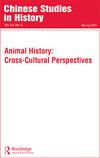Between the old and the new: Reevaluating the Critical Review and its legacy—Editors’ introduction
IF 0.2
4区 历史学
0 ASIAN STUDIES
引用次数: 0
Abstract
One day in May 1930, Irving Babbitt (1865–1933), the Harvard professor in French literature and a leading advocate of New Humanism, traveled to New York city and had an open debate with his critics in the Carnegie Hall. According to his followers who attended the event, Babbitt did not do so well facing his critics on the occasion. But the debate nevertheless was a landmark event in the development of New Humanism in America. Here it perhaps not the place to give a detailed introduction to New Humanism. Suffice it to say that Babbitt and his friends and supporters were unhappy with the decline of classical culture in the advancement of modern social life in America. They argued the need for preserving and promoting the humanist ideals nurtured by and anchored on ancient Greek and Roman culture against the erosion of scientism on the one hand and utilitarianism and individualism on the other. To prove that ancient wisdom and morals remained a valuable model for guiding modern life, Babbitt also extended his interest from the Judeo-Christian world to early traditions of the East, such as the teachings of both Buddhism and Confucianism. It is worth noting that the debate Irving Babbitt had with his critics, such as John Dewey (1859– 1952), had a Chinese rehearsal a decade or so before. After Qing China suffered a crushing defeat at the hands of Japan in the last days of the nineteenth century, the interest in studying abroad cascaded into a strong trend among young Chinese students. At the turn of the twentieth century, for example, the number of Chinese students enrolled in various levels of Japanese schools was estimated to be as high as 20,000. Animated by the rising tide of Chinese nationalism, some of these students took a heroic role in the revolutionary activities that eventually brought the Qing dynasty to an end in 1911. When the country’s political power shifted, the study-abroad trend shifted away from Japan and toward the United States and Europe. The fact that the US government decided to offer the Boxer Indemnity Scholarship to talented Chinese students at the time (using the retribution paid by the Qing for the Boxer Rebellion of 1900) fueled the directional change. Among the students who received the scholarship and began their studies in the United States emerged a number of future Chinese leaders in a variety of fields. Hu Shi 胡適 (1891–1962), who attended Cornell and Columbia between 1910 and 1917, was a notable example. Hu, dubbed “the father of the Chinese renaissance,” advocated for the venacularization of written Chinese, or the “vernacular Chinese movement” (白話文運動). His hope was to foster a sense of citizenship among the populace for the young republic by facilitating social communication and closing the gap between the educated and uneducated classes. Hu’s advocacy was met with enthusiastic support from the faculty and students at Peking University, where he returned from the United States as a professor of philosophy. A disciple of John Dewey at Columbia, Hu was also a staunch supporter and exponent of American pragmatism, which he believed represented a form of modern scientific thinking, badly needed for the Chinese. During 1919 and 1921, while Dewey was visiting Japan, Hu and others arranged him to give a lecture tour in China. Dewey’s explanation of modern scientific culture and method found favor in the burgeoning Chinese academic community. Meanwhile, Hu Shi’s vernacularization project encountered opposition and criticism, as was his promotion and exposition of Deweyan philosophy as an embodiment of modern Western新旧之间:对《评论》及其遗产的再评价——编辑引论
1930年5月的一天,哈佛大学法国文学教授、新人文主义的主要倡导者欧文·巴比特(1865-1933)前往纽约市,在卡内基音乐厅与他的批评者进行了公开辩论。据出席活动的追随者称,巴比特在面对批评者时表现不佳。然而,这场辩论是美国新人文主义发展史上的一个里程碑式事件。这里也许不是详细介绍新人文主义的地方。可以说,巴比特和他的朋友和支持者对古典文化在美国现代社会生活中的衰落感到不满。他们认为,有必要保护和促进由古希腊和罗马文化培育并建立在其基础上的人文主义理想,一方面反对科学主义,另一方面反对功利主义和个人主义的侵蚀。为了证明古代的智慧和道德仍然是指导现代生活的宝贵典范,巴比特还将他的兴趣从犹太-基督教世界扩展到东方的早期传统,如佛教和儒家的教义。值得注意的是,欧文·巴比特与他的批评者,如约翰·杜威(1859-1952)的辩论,在大约十年前就有过一次中国式的预演。19世纪末,清朝在日本手中惨败后,中国年轻学生对留学的兴趣高涨。例如,在二十世纪之交,日本各级学校招收的中国学生估计高达20000人。在中国民族主义浪潮的鼓舞下,这些学生中的一些人在革命活动中发挥了英雄作用,最终在1911年结束了清朝。当国家政权转移时,出国留学的趋势从日本转向美国和欧洲。当时,美国政府决定向有才华的中国学生提供庚子赔款奖学金(利用清朝对1900年义和团起义的报复),这一事实推动了方向的改变。在获得奖学金并开始在美国学习的学生中,涌现出了许多未来中国在各个领域的领导者。胡适胡適 (1891-1962),1910年至1917年间就读于康奈尔大学和哥伦比亚大学,就是一个著名的例子。胡被称为“中国文艺复兴之父”,他提倡书面汉语的“白话文运动”(白話文運動). 他希望通过促进社会交流和缩小受过教育和未受过教育的阶层之间的差距,在年轻的共和国民众中培养公民意识。胡的主张得到了北京大学师生的热烈支持,他从美国回来担任哲学教授。作为约翰·杜威在哥伦比亚大学的弟子,胡也是美国实用主义的坚定支持者和倡导者,他认为实用主义代表了中国人急需的现代科学思想。1919年至1921年,杜威访日期间,胡等安排他到中国讲学。杜威对现代科学文化和科学方法的阐释受到了中国学术界的青睐。同时,胡适的乡土化工程也遭到了反对和批评,他对作为现代西方的具体体现的杜威哲学的提倡和阐述也是如此
本文章由计算机程序翻译,如有差异,请以英文原文为准。
求助全文
约1分钟内获得全文
求助全文
来源期刊

CHINESE STUDIES IN HISTORY
Multiple-
CiteScore
0.20
自引率
0.00%
发文量
5
期刊介绍:
Chinese Studies in History makes noteworthy works and important trends of historical study in the Chinese-speaking world available to English-language readers. Thematic issues present original papers or articles from academic journals and anthologies that have been selected for translation because of their excellence, interest, and contribution to scholarship on the topic. Topical coverage ranges over all periods and subfields of Chinese and East Asian history as well as more general theoretical and historiographical questions of interest to historians of many specialties. Each issue includes a substantive introduction by the editor or specialist guest editor.
 求助内容:
求助内容: 应助结果提醒方式:
应助结果提醒方式:


